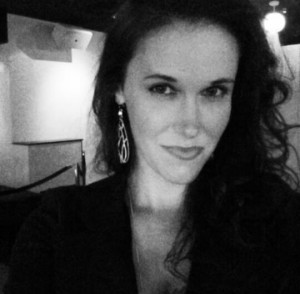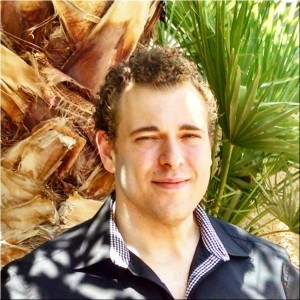Meet our Undergraduate Editorial Review Board (uERB) and Leadership Development Team (LDT)
More photos and bios coming soon!
Michael Annese, SUNY Buffalo
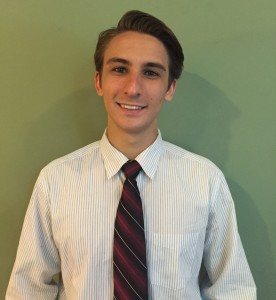 My Name is Michael Annese and I am a junior at the State University of New York at Buffalo. I am currently studying economics with minors in cultural anthropology and Japanese language. I am a member of the International Society of Ecological Economics, as well as its United States branch. My ultimate goal is to be a research scientist and professor. I am interested in studying social evolution and getting a better understanding of its implications for public policy. I am interested in non-western culture, including religions, language and social structure. I want to be a part of interdisciplinary research and collaboration in order to understand human culture, behavior, and movement from as many perspectives as possible.
My Name is Michael Annese and I am a junior at the State University of New York at Buffalo. I am currently studying economics with minors in cultural anthropology and Japanese language. I am a member of the International Society of Ecological Economics, as well as its United States branch. My ultimate goal is to be a research scientist and professor. I am interested in studying social evolution and getting a better understanding of its implications for public policy. I am interested in non-western culture, including religions, language and social structure. I want to be a part of interdisciplinary research and collaboration in order to understand human culture, behavior, and movement from as many perspectives as possible.
Toe Aung, Albright College
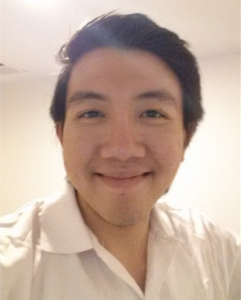 My name is Toe Aung. I am a junior student, majoring biopsychology at Albright College in Reading, PA. I also minor in evolutionary psychology. To me, evolutionary psychology is the heart of my interests in psychology, unifying all the themes and explaining the ultimate causation of WHY. My major research interests are mating behaviors, mating strategies, helping behaviors and religions from evolutionary perspectives. At Albright College, I serve as teaching assistant for research methods classes and peer tutor for psychology classes. Recently, I participate as a research intern in Summer 2015 NSF Research Experiences for Undergraduates at Northern Arizona University. The research explores how certain neural mechanisms such as Mu waves might reflect putative mirror properties and are wired in humans for survival, using EEG studies.
My name is Toe Aung. I am a junior student, majoring biopsychology at Albright College in Reading, PA. I also minor in evolutionary psychology. To me, evolutionary psychology is the heart of my interests in psychology, unifying all the themes and explaining the ultimate causation of WHY. My major research interests are mating behaviors, mating strategies, helping behaviors and religions from evolutionary perspectives. At Albright College, I serve as teaching assistant for research methods classes and peer tutor for psychology classes. Recently, I participate as a research intern in Summer 2015 NSF Research Experiences for Undergraduates at Northern Arizona University. The research explores how certain neural mechanisms such as Mu waves might reflect putative mirror properties and are wired in humans for survival, using EEG studies.
Melissa Hopkins, Bucknell University
I am a rising senior at Bucknell University, double majoring in psychology and philosophy while minoring in religion. My research interests include the evolutionary adaptations involved in moral judgments and decisions as well as the evolutionary adaptations involved in religious, superstitious, and prosocial behavior. I have been involved with independent undergraduate research and hope to continue with a career in research through academia. When I have time, I enjoy cooking, hiking, good company, and reading classic novels and essays.
Emilio Jacintho, University of Nevada, Las Vegas
My education began while growing up in Tewksbury, Massachusetts; a small community north of Boston. From quite a young age, I became fascinated by all things scientific, especially the application of evolutionary principles and human behavior. Currently, I’m an undergraduate at the University of Nevada, Las Vegas, where I am pursuing a double major in Anthropology and Psychology. By utilizing this interdisciplinary approach, I am concentrating on evolutionary psychology. Some of my research focuses particularly on costly signaling and its application to social phenomena like altruism, social norms, political coordination and mating strategy. Upon graduation, my goal is to continue my education into graduate school to further develop my understanding of human behavior.
Ananna Kazi, Binghamton University
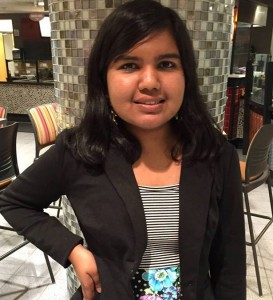 I am a junior at Binghamton University, majoring in Integrative Neuroscience and minoring in Evolutionary Studies. My interest in evolution was sparked after I took the ‘Survey of Organismal and Population Biology’ course at Binghamton. I want to go to medical college and become a physician after I graduate. I have served as a chemistry and psychology teaching assistant for one year. I have also done research on depression in children at the Binghamton Mood Disorder Institute. I participate as a research fellow in National Institute of Digestive Disease and Kidney (NIDDK) research for undergraduates at Albert Einstein College of Medicine. My research focuses on the etiologies of kidney disease conditions in children and adult.
I am a junior at Binghamton University, majoring in Integrative Neuroscience and minoring in Evolutionary Studies. My interest in evolution was sparked after I took the ‘Survey of Organismal and Population Biology’ course at Binghamton. I want to go to medical college and become a physician after I graduate. I have served as a chemistry and psychology teaching assistant for one year. I have also done research on depression in children at the Binghamton Mood Disorder Institute. I participate as a research fellow in National Institute of Digestive Disease and Kidney (NIDDK) research for undergraduates at Albert Einstein College of Medicine. My research focuses on the etiologies of kidney disease conditions in children and adult.
Saara Knapp, Binghamton University
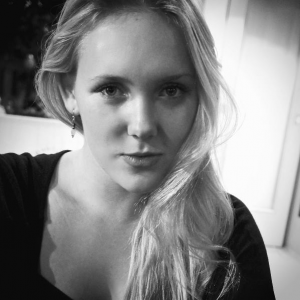 I am a senior at Binghamton University double-majoring in Biological Anthropology and Biology with a concentration in Ecology, Evolution, and Behavior, and am a member of the undergraduate EvoS program. To me, Evolutionary Studies is the key to tying all of the biological fields of science together in a way that is truly unique. Studying and understanding evolution is a way to break the cypher that explains why and how we got here, and I am always amazed by what new research brings forth. I hope to become more involved in such research during this last year of my undergraduate career. In my free time I enjoy volunteering at a local hospital, working on my French, spending time outdoors, watching movies, and reading.
I am a senior at Binghamton University double-majoring in Biological Anthropology and Biology with a concentration in Ecology, Evolution, and Behavior, and am a member of the undergraduate EvoS program. To me, Evolutionary Studies is the key to tying all of the biological fields of science together in a way that is truly unique. Studying and understanding evolution is a way to break the cypher that explains why and how we got here, and I am always amazed by what new research brings forth. I hope to become more involved in such research during this last year of my undergraduate career. In my free time I enjoy volunteering at a local hospital, working on my French, spending time outdoors, watching movies, and reading.
Eric Kubacki, University of St. Francis
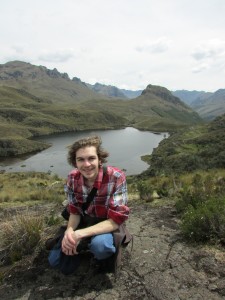 Howdy! My name is Eric Kubacki. I am a Biology Pre-Med Major with Chemistry and English-Writing Minors at the University of St. Francis in Joliet, Illinois. I have a love for and fascination with cardiology specifically, and am currently considering a career in that field. My interest in evolutionary studies stems from my experience with the study of sexual selection and communication among spiders as well as tarantulas, both in the field and in the lab setting, with the Spider Research Lab at my school. For example, we’ve investigated behavioral ecology and how populations of wolf spiders change over time, integrating aspects of invasive species ecology and sensory physiology to address questions like: How do large invertebrate predators coexist in complex ecosystems? And, how do these species interact over developmental time (phenology)? My hobbies include reading, writing, riding my dad’s ol’ 1985 Schwinn around, and really just having conversations with people about the things they are passionate about.
Howdy! My name is Eric Kubacki. I am a Biology Pre-Med Major with Chemistry and English-Writing Minors at the University of St. Francis in Joliet, Illinois. I have a love for and fascination with cardiology specifically, and am currently considering a career in that field. My interest in evolutionary studies stems from my experience with the study of sexual selection and communication among spiders as well as tarantulas, both in the field and in the lab setting, with the Spider Research Lab at my school. For example, we’ve investigated behavioral ecology and how populations of wolf spiders change over time, integrating aspects of invasive species ecology and sensory physiology to address questions like: How do large invertebrate predators coexist in complex ecosystems? And, how do these species interact over developmental time (phenology)? My hobbies include reading, writing, riding my dad’s ol’ 1985 Schwinn around, and really just having conversations with people about the things they are passionate about.
Christopher Santos, University of Baltimore
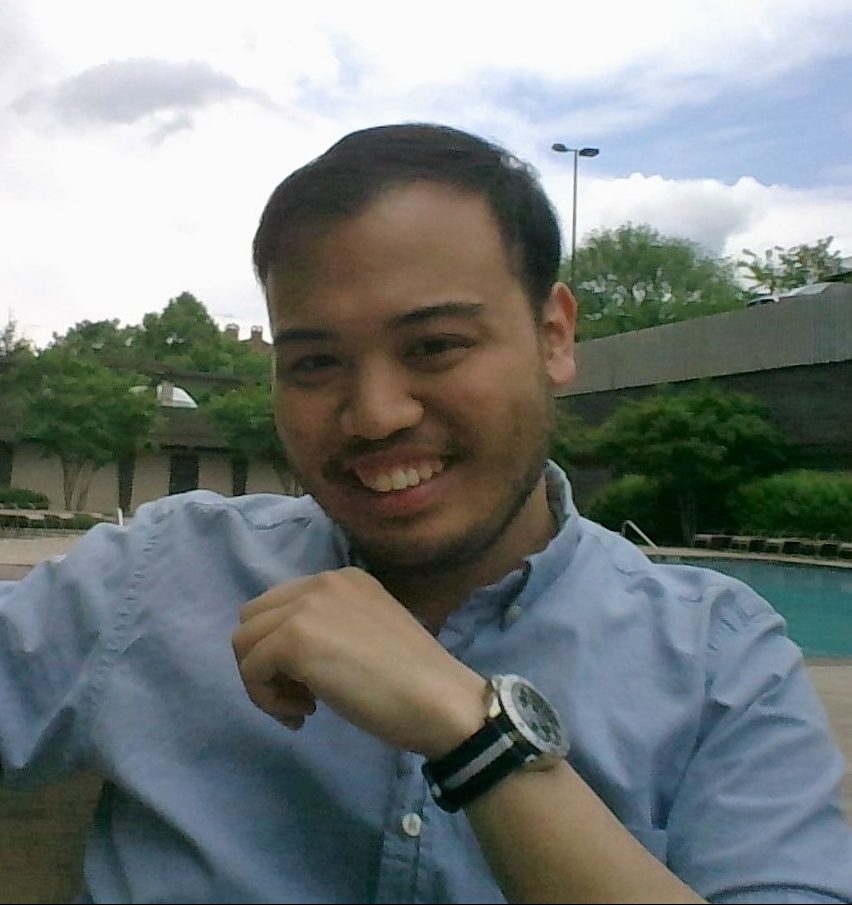 My name is Chris Santos, and I am entering my senior year in Psychology at the University of Baltimore in Maryland. When it comes to evolutionary psychology, I am most curious about how certain behaviors can be seen throughout history and why such actions were important to begin with. It is interesting how survival or social instincts from the past are still necessary and carried out in modern society, particularly with interpersonal relationships. While I am interested in doing some field work to gain experience, my long term goal is to eventually end up teaching. This year I will be assisting in research in the area of social psychology.
My name is Chris Santos, and I am entering my senior year in Psychology at the University of Baltimore in Maryland. When it comes to evolutionary psychology, I am most curious about how certain behaviors can be seen throughout history and why such actions were important to begin with. It is interesting how survival or social instincts from the past are still necessary and carried out in modern society, particularly with interpersonal relationships. While I am interested in doing some field work to gain experience, my long term goal is to eventually end up teaching. This year I will be assisting in research in the area of social psychology.
Benjamin Seitz, Binghamton University
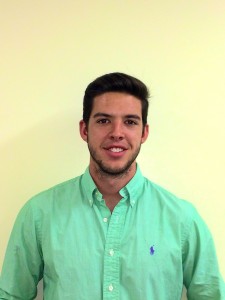 I am Junior at Binghamton University majoring in psychology and evolutionary studies, a major I created through my university’s Individualized Major Program. I am president of Binghamton’s Evolutionary Studies Student Association that seeks to promote the implementation of evolutionary theory in in a wide variety of academic fields. I have also been involved in undergraduate research for both the Binghamton Religion and Spirituality Project and the Binghamton Neighborhood project, and will start a research assistant position in Ralph R. Miller’s lab of psychology next semester, where we will study the cognitive process and evolutionary significance of memory loss. My research interests lie particularly in life history evolution and how life history strategies differ within species due to environmental influences. I hope to enter a PhD program in Evolutionary Psychology upon graduating from Binghamton University.
I am Junior at Binghamton University majoring in psychology and evolutionary studies, a major I created through my university’s Individualized Major Program. I am president of Binghamton’s Evolutionary Studies Student Association that seeks to promote the implementation of evolutionary theory in in a wide variety of academic fields. I have also been involved in undergraduate research for both the Binghamton Religion and Spirituality Project and the Binghamton Neighborhood project, and will start a research assistant position in Ralph R. Miller’s lab of psychology next semester, where we will study the cognitive process and evolutionary significance of memory loss. My research interests lie particularly in life history evolution and how life history strategies differ within species due to environmental influences. I hope to enter a PhD program in Evolutionary Psychology upon graduating from Binghamton University.
Rafael Schulman, Binghamton University
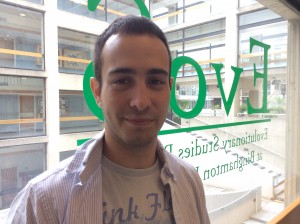 I am a senior at Binghamton University majoring in Integrative Neuroscience and Evolutionary Studies. I was originally drawn to Binghamton for it’s strong EvoS program, which has provided a launching pad for my academic curiosity. In college I have held research positions in neuroscience, psychology, and physics labs, committing myself to the study of evolution across disciplines. Most recently, I have begun studying the application of Evolutionary Algorithms as a way to solve complex problems. My passion for evolutionary studies reaches beyond the lab and my coursework. As an active member of the EvoS student organizations I have organized events to publicize EvoS research to a broader audience, and have organized public debates to engage the humanities and confront moral questions. Outside of EvoS, I am a member of the Binghamton Debate Team and play Scrum Half for the Binghamton Rugby Team.
I am a senior at Binghamton University majoring in Integrative Neuroscience and Evolutionary Studies. I was originally drawn to Binghamton for it’s strong EvoS program, which has provided a launching pad for my academic curiosity. In college I have held research positions in neuroscience, psychology, and physics labs, committing myself to the study of evolution across disciplines. Most recently, I have begun studying the application of Evolutionary Algorithms as a way to solve complex problems. My passion for evolutionary studies reaches beyond the lab and my coursework. As an active member of the EvoS student organizations I have organized events to publicize EvoS research to a broader audience, and have organized public debates to engage the humanities and confront moral questions. Outside of EvoS, I am a member of the Binghamton Debate Team and play Scrum Half for the Binghamton Rugby Team.
Steve Tortora, Binghamton University
 I am a senior at Binghamton University majoring in Philosophy. My main interests reside in the areas of philosophy of mind, metaphysics, epistemology, and language. Currently, I am pursuing research on Phenomenal Intentionality, which primarily involves aspects of philosophy of mind and philosophy of language. From my perspective, evolutionary theory has interesting metaphysical and epistemic implications, in that it suggests a ‘bottom up’ rather than ‘top-down’ structure of natural phenomena. Aside from philosophy, I am an avid hiker, musician, and environmental activist.
I am a senior at Binghamton University majoring in Philosophy. My main interests reside in the areas of philosophy of mind, metaphysics, epistemology, and language. Currently, I am pursuing research on Phenomenal Intentionality, which primarily involves aspects of philosophy of mind and philosophy of language. From my perspective, evolutionary theory has interesting metaphysical and epistemic implications, in that it suggests a ‘bottom up’ rather than ‘top-down’ structure of natural phenomena. Aside from philosophy, I am an avid hiker, musician, and environmental activist.
Faculty Advisors to the Undergraduate Editorial Board:
Holly Dunsworth, Anthropology Advisor
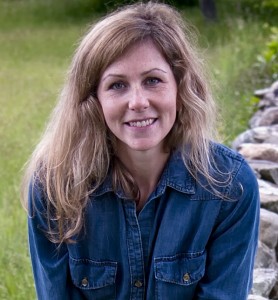 Holly Dunsworth is an anthropologist at the University of Rhode Island. She teaches courses on human evolution with new and original approaches aimed at overturning evolutionary misconceptions and outdated evolutionary dogma that students bring to college. At the early Miocene sites on Rusinga Island, Kenya she performs paleontological research where ancient fossil apes are preserved, and she also studies live and recently live primates including, of course, humans. She’s particularly interested in how life history traits evolve—especially the anatomical, physiological, and behavioral traits related to making, growing, and raising offspring. You can find her research, scholarship, and writing in various books and journals. She’s presently co-authoring a book with Anne Buchanan called The Baby Makers and she regularly contributes to the science blog The Mermaid’s Tale(http://ecodevoevo.blogspot.
Holly Dunsworth is an anthropologist at the University of Rhode Island. She teaches courses on human evolution with new and original approaches aimed at overturning evolutionary misconceptions and outdated evolutionary dogma that students bring to college. At the early Miocene sites on Rusinga Island, Kenya she performs paleontological research where ancient fossil apes are preserved, and she also studies live and recently live primates including, of course, humans. She’s particularly interested in how life history traits evolve—especially the anatomical, physiological, and behavioral traits related to making, growing, and raising offspring. You can find her research, scholarship, and writing in various books and journals. She’s presently co-authoring a book with Anne Buchanan called The Baby Makers and she regularly contributes to the science blog The Mermaid’s Tale(http://ecodevoevo.blogspot.
Maryanne Fisher, Psychology Advisor (spring semester 2016)
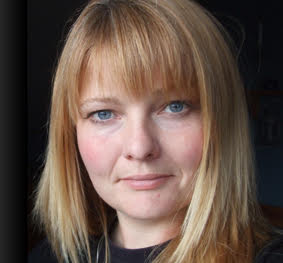 Maryanne L. Fisher, PhD, is a Professor in the Department of Psychology at Saint Mary’s University in Halifax, Canada. She has recently edited Evolution’s Empress: Darwinian Perspectives on the Nature of Women (Oxford, 2013) and the Handbook of Women and Competition (Oxford, forthcoming). Her primary areas of inquiry are sex differences in competition and aggression, within-sex variance in mating strategies, and integrating feminist frameworks with evolutionary psychological perspectives.
Maryanne L. Fisher, PhD, is a Professor in the Department of Psychology at Saint Mary’s University in Halifax, Canada. She has recently edited Evolution’s Empress: Darwinian Perspectives on the Nature of Women (Oxford, 2013) and the Handbook of Women and Competition (Oxford, forthcoming). Her primary areas of inquiry are sex differences in competition and aggression, within-sex variance in mating strategies, and integrating feminist frameworks with evolutionary psychological perspectives.
Aaron Goetz, Psychology Advisor
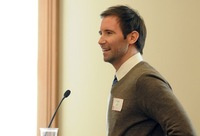 Aaron Goetz, PhD, is an associate professor of psychology at Califorina State University, Fullerton. He and his students carefully apply evolutionary perspectives to issues surrounding aggressive intrasexual competition, including the psychological architecture of formidability assessments and the implicit rules of violence. He considers himself a science custodian, with interests in reducing research degrees of freedom, increasing replicability, and increasing transparency. He’s also a part-time farmer with a dozen goats and several dozen chickens.
Aaron Goetz, PhD, is an associate professor of psychology at Califorina State University, Fullerton. He and his students carefully apply evolutionary perspectives to issues surrounding aggressive intrasexual competition, including the psychological architecture of formidability assessments and the implicit rules of violence. He considers himself a science custodian, with interests in reducing research degrees of freedom, increasing replicability, and increasing transparency. He’s also a part-time farmer with a dozen goats and several dozen chickens.
Jed Mayer, English Advisor
Aaron Haselton, Biology Advisor
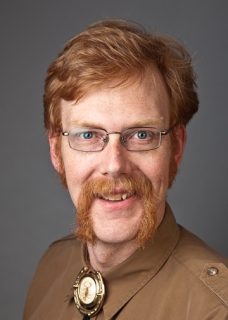 As an insect physiologist, I am interested in understanding the mechanisms that make possible the tremendous evolutionary success of this large and diverse class of animals. Much of my work focuses on insect nutritional physiology, with particular emphasis on neuroendocrine involvement.
As an insect physiologist, I am interested in understanding the mechanisms that make possible the tremendous evolutionary success of this large and diverse class of animals. Much of my work focuses on insect nutritional physiology, with particular emphasis on neuroendocrine involvement.
David Livingstone Smith, Philosophy Advisor
 David Livingstone Smith, Ph.D., is professor of philosophy at the University of New England, in Maine. He is the author of seven books and numerous academic papers. His books have been translated into Japanese, Korean, Spanish, Portuguese, Polish, Chinese, and Taiwanese.
David Livingstone Smith, Ph.D., is professor of philosophy at the University of New England, in Maine. He is the author of seven books and numerous academic papers. His books have been translated into Japanese, Korean, Spanish, Portuguese, Polish, Chinese, and Taiwanese.
His book Less Than Human: Why We Demean, Enslave, and Exterminate Others won the 2012 Anisfield-Wolf award for non-fiction. Smith’s work has been featured widely in the national and international media, including the New York Times, the Wall Street Journal,the Financial Times, the Guardian, the Times of London, Newsweek, El Universal, Scientific American, Popular Science, the Chicago Tribune, National Public Radio, various NPR affiliates, three prime-time TV documentaries, among many others, including a presentation at the 2012 G20 economic summit.
How to apply for 2016/2017
Positions for both the Undergraduate Editorial Review Board (uERB) and the Leadership Development Team (LDT) suggest commitments for a one-year, extendable term, currently, May 2016-May 2017. Participation is volunteer-based, and students may spend between 2-10 hours per month varying over the academic year. Students will need to participate in both the uERB & LDT.
Undergraduate Editorial Review Board (uERB)
Students on the EvoS Journal – uERB form the core of our quality control team in undergraduate publications. We are seeking undergraduate students from across all of evolutionary studies scholarship, including natural sciences, social sciences, humanities, and especially interdisciplinary approaches.
- Understand the peer-review process by directly engaging in it
- Work with LDT to grow the quality and quantity of EvoS Journal scholarship
- Enhance your own academic writing by understanding the peer-review process
Leadership Development Team (LDT)
The EvoS Journal – LDT offers passionate undergraduates an opportunity to simultaneously cultivate their own academic career, and the EvoS Network. Diverse and flexible projects can be developed around the interests of participating students.
- Learn science communication and networking skills
- Flexible approach for individual student interests
- Theory-based and/or community-based oppportunities
To apply for either the uERB or the LDT, send an e-mail to EvoStudies@Gmail.com,
including your CV and 1-3 paragraphs describing your interest in the EvoS Consortium.
We look forward to working with you!

